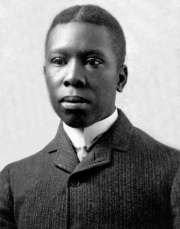|
Biografie Paul Laurence Dunbar
Romancier, nuvelist și poet. A cântat în special pe muncitorii negri, într-un stil caracterizat printr-un anumit patos și umor natural.
***
Paul Laurence Dunbar (June 27, 1872 – February 9, 1906) was a seminal American poet of the late 19th and early 20th centuries. Dunbar gained national recognition for his 1896 Lyrics of a Lowly Life, one poem in the collection Ode to Ethiopia. In 2002, scholar Molefi Kete Asante listed Paul Laurence Dunbar on his list of 100 Greatest African Americans.
Dunbar was born in Dayton, Ohio to parents who had escaped from slavery; his father was a veteran of the American Civil War, having served in the 55th Massachusetts Infantry Regiment and the 5th Massachusetts Colored Cavalry Regiment. His parents instilled in him a love of learning and history. He was a student at an all-white high school, Dayton Central High School, and he participated actively as a student. During high school, he was both the editor of the school newspaper and class president, as well as the president of the school literary society. Dunbar had also started the first African-American newsletter in Dayton.
He wrote his first poem at age 6 and gave his first public recital at age 9. Dunbar's first published work came in a newspaper put out by his high school friends Wilbur and Orville Wright, who owned a printing plant. The Wright Brothers later invested in the Dayton Tattler, a newspaper aimed at the black community, edited and published by Dunbar.
His first collection of poetry, Oak and Ivy, was published in 1892 and attracted the attention of James Whitcomb Riley, the popular "Hoosier Poet". Both Riley and Dunbar wrote poems in both standard English and dialect. His second book, Majors and Minors (1895) brought him national fame and the patronage of William Dean Howells, the novelist and critic and editor of Harper's Weekly. After Howells' praise, his first two books were combined as Lyrics of Lowly Life and Dunbar started on a career of international literary fame. He moved to Washington, D.C., in the LeDroit Park neighborhood. While in Washington, he attended Howard University.
His wife Alice Dunbar Nelson was a famous poet as well. A graduate of Dillard University in New Orleans, her most famous works include a short story entitled "Violets". She and her husband also wrote books of poetry as companion pieces. An account of their love, life and marriage was depicted in a play by Kathleen McGhee-Anderson titled Oak and Ivy.
He kept a lifelong friendship with the Wrights, and was also associated with Frederick Douglass and Booker T. Washington. Brand Whitlock was also described as a close friend. He was honored with a ceremonial sword by President Theodore Roosevelt.
He wrote a dozen books of poetry, four books of short stories, five novels, and a play. He also wrote lyrics for In Dahomey - the first musical written and performed entirely by African-Americans to appear on Broadway in 1903; the musical comedy successfully toured England and America over a period of four years - one of the more successful theatrical productions of its time. His essays and poems were published widely in the leading journals of the day. His work appeared in Harper's Weekly, the Saturday Evening Post, the Denver Post, Current Literature and a number of other publications. During his life, considerable emphasis was laid on the fact that Dunbar was of pure black descent, with no white ancestors ever.
Dunbar's work is known for its colorful language and use of dialect, and a conversational tone, with a brilliant rhetorical structure.
Dunbar traveled to England in 1897 to recite his works on the London literary circuit. He met the brilliant young black composer Samuel Coleridge-Taylor who some of his poems to music and who was influenced by Dunbar to use African and American Negro songs and tunes in future compositions.
After his return, Dunbar took a job at the Library of Congress in Washington. In 1900, Dunbar was diagnosed with tuberculosis, and moved to Colorado with his wife on the advice of his doctors. Dunbar died at age thirty-three on February 9, 1906 from tuberculosis, and was interred in the Woodland Cemetery, Dayton, Ohio.
|




